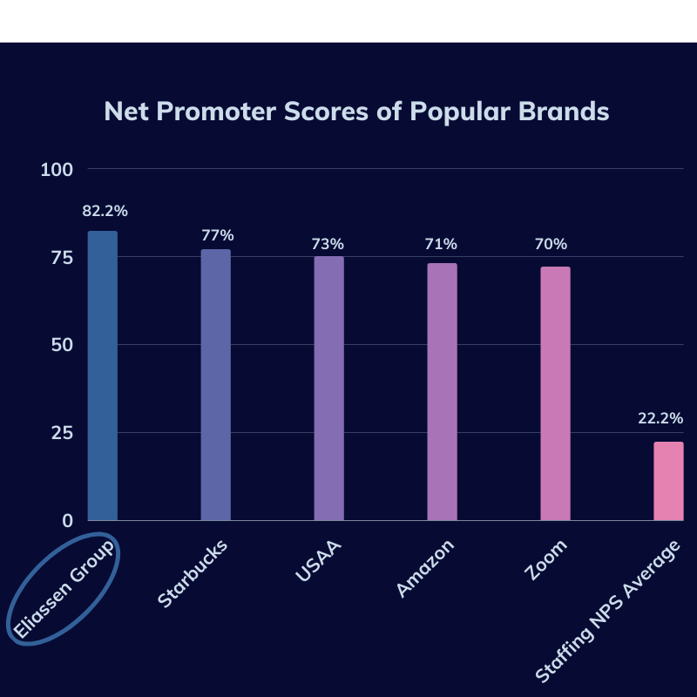What is the meaning of an NPS score, and why does it matter? A company’s NPS or Net Promoter Score is a measurement of customer satisfaction.1 These scores are especially useful in the staffing industry, in which feedback isn’t linked to a tangible product, but is instead related to a more subjective service or experience. For example, when a client says their experience with us was “good,” it’s difficult to derive true meaning from that response, especially as the definition of “good” likely varies vastly from client to client. Thus, the staffing industry was in need of a universally understood, tangible measure of a subjective experience. Enter NPS. While NPS surveys can ask a number of questions, the concept truly focuses on only one:
How likely are you to recommend your firm to a friend or colleague? 1
The concept of the Net Promoter Score was invented by Frederick F. Reichheld, who introduced the idea in a 2003 article for the Harvard Business Review. As Reichheld explains:
“It turned out that a single survey question can, in fact, serve as a useful predictor of growth. But that question isn’t about customer satisfaction or even loyalty- at least in so many words. Rather, it’s about customers’ willingness to recommend a product or service to someone else.” 2
The Net Promoter Score is a useful tool in a number of industries. In the staffing industry, an NPS can be calculated for both the client and the consultant side of the business, and it is deeply revealing of the quality of service provided to each.
How Are Net Promoter Scores Measured?
When asked how likely someone is to recommend your firm to a friend or colleague, the client or consultant uses a numeric scale of 0-10 (ten = extremely likely, zero = not likely at all), which introduces a universal value measurement to further derive satisfaction beyond a simple “yes” or “no.” As explained in “NPS® 101 for Staffing and Recruiting Firms,” “Your firm’s NPS ‘score’ is calculated by subtracting the percentage of detractors from the percentage of promoters.”3 The full range of identities, including Promoters, Passives, and Detractors, are connected to a selected 0-10 scale:
%20-2.png?width=799&name=EGBlog_Net-Promoter-Scores-What-Do-The-Numbers-Really-Mean-Identities_OK_(041921)%20-2.png) Figure 1 – Explanation of Promoters, Passives, and Detractors 3
Figure 1 – Explanation of Promoters, Passives, and Detractors 3
Using this system of classification and the accompanying formula, Reichheld has proven that “firms with the highest net-promoter scores consistently garner the lion’s share of industry growth.”2
Eliassen Group’s Net Promoter Scores
At Eliassen Group, we take great pride in consistently maintaining world-class Net Promoter Scores. In the staffing industry, an NPS of 50% is considered excellent, and a score of 70% or above is lauded as “world-class.” It should also be noted that the average NPS score for staffing consultants is 22.2%, based on overall satisfaction with their firm.2
Eliassen Group’s NPS is 82.2% based on over 15,000 surveys, differentiating us from the rest of the industry and classifying us as a world-class staffing provider.
Eliassen Group excels when compared to acclaimed brands outside of the staffing industry that are highly regarded for their customer service.

Figure 2 – Some of the highest NPS scores among Popular Brands 4
What Do the Highest NPS Scores Tell Us?
We know that Net Promoter Scores give us an indication of customer satisfaction, but why is it essential that the customer be satisfied? It seems like a silly question- obviously you want your customers to be satisfied with your product or service to ensure that they continue to engage with your product or service, right?
That’s true, but a healthy NPS is actually indicative of so much more. Eric Gregg of ClearlyRated, a company that administers client satisfaction surveys, explains that a correlation exists across NPS, customer retention, AND revenue growth. In a 2022 blog post, he explains, “By quantifying intangible concepts like client satisfaction, talent satisfaction, and service quality, NPS provides staffing and recruiting firms with a singular metric to weigh performance, set improvement goals, and to rally the team around.”3
In short…
Net Promoter Scores are a simple and universal third-party measure of excellence. In order to maintain a world-class NPS, and more importantly, in order to effectively support our consultants, Eliassen Group has created an entire talent engagement program. Our Consultant Advocate Program, or CAP, is available to support our consultants 24/7, and this commitment to excellent service to our consultants, and thereby exceptional service to our clients, is proven by our world-class Net Promoter Score.
FAQ on Net Promoter Scores
1. What is a Net Promoter Score (NPS)?
A Net Promoter Score (NPS) is a metric used to measure customer satisfaction and loyalty. It is based on how likely customers are to recommend a company’s products or services to others. Respondents rate their likelihood on a scale of 0-10, and the score is calculated by subtracting the percentage of Detractors (0-6) from the percentage of Promoters (9-10).
2. What is a good Net Promoter Score?
In the staffing industry, a score of 50% is considered excellent. Scores of 70% or above are classified as “world-class,” indicating outstanding customer satisfaction and loyalty.
3. What is the highest Net Promoter Score a company can achieve?
The highest possible Net Promoter Score a company can achieve is 100%. This would mean that every respondent is a Promoter and none are Detractors. In reality, very few companies achieve such a score. However, an NPS of 70% or higher is often regarded as exceptional and world-class.
4. How is Net Promoter Score calculated?
NPS is calculated by asking customers to rate their likelihood of recommending a company on a scale of 0-10. Respondents are categorized as Promoters (9-10), Passives (7-8), and Detractors (0-6). The score is calculated by subtracting the percentage of Detractors from the percentage of Promoters.
5. Why is a good Net Promoter Score important for businesses?
A good Net Promoter Score is important because it indicates high customer satisfaction and loyalty, which can lead to increased customer retention, positive word-of-mouth referrals, and revenue growth. It also provides businesses with valuable feedback on their customer experience and service quality.
6. How does the staffing industry's average Net Promoter Score compare to other industries?
In the staffing industry, the average Net Promoter Score is around 22.2%. Scores above 50% are considered excellent, while scores of 70% or higher are deemed world-class. Eliassen Group, for example, has a Net Promoter Score of 82.2%, which is significantly higher than the industry average.
7. What factors contribute to achieving the highest Net Promoter Score?
Achieving the highest Net Promoter Score requires consistently delivering exceptional customer service, understanding client needs, providing personalized support, and creating a positive overall experience. Continuous feedback collection and a strong commitment to improvement also play key roles in attaining a high NPS.
8. Can a company have a negative Net Promoter Score?
Yes, a company can have a negative Net Promoter Score if the percentage of Detractors is greater than the percentage of Promoters. This indicates that more customers are dissatisfied and unlikely to recommend the company.
9. How often should a company measure its Net Promoter Score?
Companies should measure their Net Promoter Score regularly to track changes in customer satisfaction and identify areas for improvement. Some businesses conduct NPS surveys annually, while others may do so quarterly or after key customer interactions.
10. What is an Employee Net Promoter Score (eNPS)?
Employee Net Promoter Score (eNPS) measures employee satisfaction and loyalty within a company. It asks employees how likely they are to recommend their workplace to others, providing insights into employee engagement and company culture.
- Gregg, Eric. “2022 Staffing Industry NPS® Benchmarks.” https://www.clearlyrated.com/solutions/staffing-nps-benchmarks/. Accessed 9 February 2023.
- Reichheld, Frederick F. “The One Number You Need to Grow.” Harvard Business Review, Dec. 2003, https://hbr.org/2003/12/the-one-number-you-need-to-grow. Accessed 9 February 2023.
3. Gregg, Eric. “NPS® 101 for Staffing and Recruiting Firms.” https://www.clearlyrated.com/solutions/nps-101-staffing-recruiting/. Accessed 9 February 2023.
4. Goodey, Ben. "Highest NPS Scores: Best NPS Scores From Top Companies In 2022." https://customergauge.com/benchmarks/blog/top-highest-nps-scores. Accessed 9 February 2023.
-reg-1.png)

%20(720%20x%20290%20px)-1.png)
